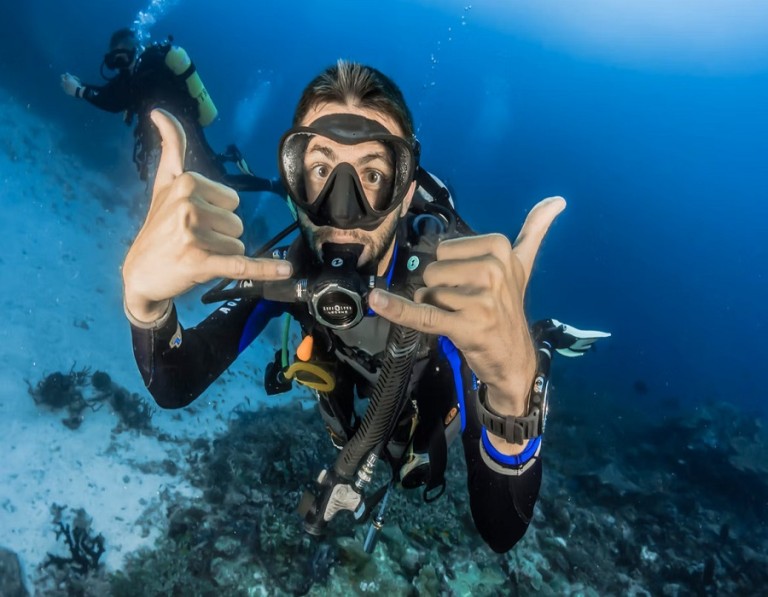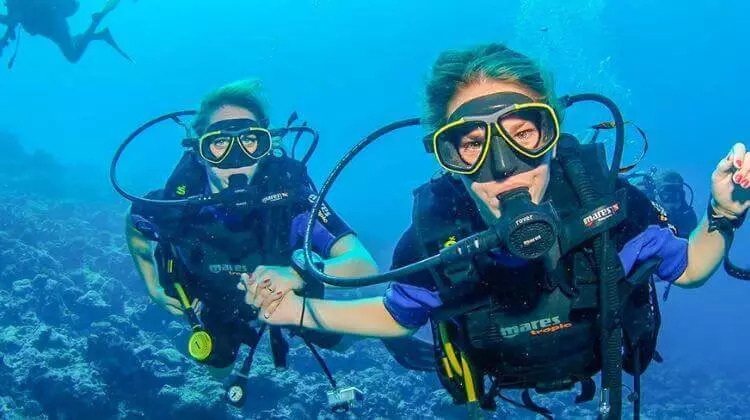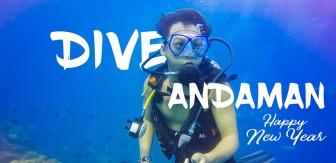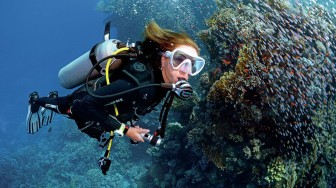Diving Sites in Port Blair




-
Aug 08, 2022
Know About Top 10 Scuba Diving Myths
You are likely to get one of these two reactions when you tell someone that you are a scuba diver. First, if the person is also a diver, then they will appreciate you and you will have a new dive buddy probably. Secondly, if they are not a diver, then they will scare you by telling you about bloodthirsty sharks and how dangerous the ocean is. A number of outdated ideas and incorrect information are circulating out there. That’s why, to put an end to all that, we present here a list of the most common scuba diving misconceptions.
Myth #1 You Should Dive Deep to See Anything Interesting
Absolutely not By staying within 18 meters/60 feet, one can witness the colorful and brighter marine world. The water is warmer here and the breathing gas lasts longer. However, there are some divers who love exploring the deep ocean.It’s completely your choice how deep you want to go as it is not mandatory.
Myth #2 Only Tropics are a Good Location for Diving
You don’t need to go specifically to the tropics for scuba diving. You can dive anywhere there’s water such as inland areas (lakes, quarries, decommissioned mines) and missile silos. According to the experts, the world’s best diving areas are cold-water regions like British Columbia, Canada, South Africa, and The United Kingdom.
Myth #3 Scuba Diving is Dangerous
If you are careless, then even activities like cycling, snowboarding, and running can be dangerous. There are certain do’s and don’ts of scuba diving that you are taught during your PADI Open Water Diver certification course. Most non-divers think that the ocean is dangerous because of sharks. However, the fact is that there are so many creatures more dangerous than sharks including dogs, cows, etc.
Myth #4 Scuba Diving is Costly
Like learning any other outdoor activity, there is some cost involved in becoming a certified scuba diver as well. Tuition for an Open Water Diver Course (6-8 hours of pool practice and four dives with an instructor) costs the same as the following:
- four private yoga lessons
- a weekend of kayaking lessons
- a weekend of fly-fishing lessons
- a weekend of rock climbing lessons
- about 3 hours of private golf lessons
- about 3 hours of private water skiing lessons
The best thing is that PADI scuba certification is for your entire life. It is your choice to level up to new adventures with a PADI instructor or explore the ocean with a buddy at your convenience. In case you haven’t dived for a long time, then take PADI’s ReActivate Scuba Refresher program in order to restore any skills that you may have forgotten.
Myth #5 Being an Expert Swimmer is Mandatory for Scuba Diving
This is one of the biggest scuba diving myths. If you are a beginner, you will see that vigorous swimming causes short dive times. On the other hand, experienced divers are relaxed. They rarely use their arms and kick with slow strokes. This is basically the opposite of what a competitive swimmer would do.
You just need to have the basic skills to become a scuba diver. This involves the ability to:
- Float or tread water for 10 minutes- Without using any floatation aids, lie on your back, on your front, tread water, dog paddle, or anything else.
- Swim 200 meters/yards (or 300 meters/yards in mask, fins, and snorkel) continuously. You can use any swimming strokes you want. Also, there is no time limit.
Anyone can become an underwater explorer by pursuing a scuba diving education. Adaptive techniques allow individuals with physical challenges to scuba dive. There are many people with paraplegia, amputations, or other challenges who have earned a PADI Open Water Diver certification.

Myth #6 Scuba Tanks are Full of Pure Oxygen
The air that we breathe has nearly 21 percent oxygen and 78 percent nitrogen. And this is what’s inside most scuba diving tanks. Recreational divers use enriched air nitrox–a blend with extra oxygen, usually 31-36 percent. It is probably due to an emergency situation if a diver is breathing pure oxygen.
Myth #7 You have to Take the Class with Someone
You can sign up for a scuba class without a partner. Of course, diving with another person is more fun and safer. But it is not mandatory. If you are lucky, then you will have lifelong friends with whom you start out as a randomly-assigned dive buddy.
Myth #8 Learning to Dive is Difficult and Time-Consuming
Nearly five decades ago, weeks of training were required to learn scuba diving. There were military-style drills in which such skills were taught that were not relevant for recreational diving.
Since then:
- Standards for recreational diving training were established by the World Recreational Scuba Training Council (WRSTC).
- Dive computers simplified dive planning.
- With the help of digital course materials, students can begin their training anytime, anywhere, and study at their convenience.
- One can get scuba certified in as little as four days.
Myth #9 Diving is Only for Young or Very Fit People
Did you know Dr. Sylvia Earle (born in 1935) is a diving legend? Retiree George Aitken got scuba certified at the age of 74 years. He and his grandson got PADI certified together. They share a very special memory of scuba diving. One for example is of a family with three generations of divers, including Grandma Carol and Grandpa Joe.
You have to consult your physician before enrolling in a scuba diving course only if you are over the age of 45 years and are currently receiving medical care or have any of the health concerns listed below:
- Have diabetes mellitus, even if controlled by diet and exercise.
- Currently smoke a pipe, cigars, or cigarettes.
- Have a family history of heart attack or stroke.
- Have high cholesterol or high blood pressure.
If your doctor has any doubts, then they can consult with a dive medical expert from Divers Alert Network (DAN). A well-recognized resource for medical professionals worldwide, DAN is affiliated with Duke University Medical Center. You can reach DAN via their online contact form or its non-emergency phone number (919) 684-2948.
Myth #10 You Can’t Dive if You have Claustrophobia
Many people do not attempt diving as they find their fears about claustrophobia unfounded. On the other hand, there are those who use it as a positive activity to overcome their fear. There are many people, who learned to scuba dive despite having intense claustrophobia. You can try a PADI Discover Scuba Diving experience in a pool or pool-like environment in case you experience claustrophobia but are willing to dive. You can wear a mask with a clear skirt. It will let in more light. Be clear about your concerns with your instructor as they will support you and make you feel absolutely safe under the water.
Diving Sites in Port Blair
Diving Sites in Havelock Island
Diving Sites in Neil Island
.jpg)
.jpg)


.jpg)